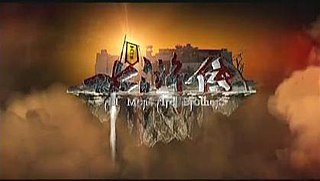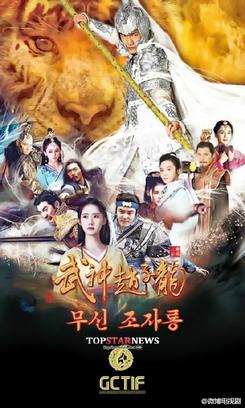
The Emperor in Han Dynasty, also released under the title The Emperor Han Wu in some countries, is a 2005 Chinese historical drama television series based on the life of Emperor Wu of the Han dynasty. It uses the historical texts Records of the Grand Historian and Book of Han as its source material.

Romance of the Three Kingdoms is a Chinese television series adapted from the classical 14th century novel of the same title by Luo Guanzhong. The series was produced by China Central Television (CCTV) and was first aired on the network in 1994. It spanned a total of 84 episodes, each approximately 45 minutes long. One of the most expensive television series produced at the time, the project cost 170 million yuan. It was completed over four years and involved over 400,000 cast and crew members, including divisions of the People's Liberation Army from the Beijing, Nanjing and Chengdu military regions. Some of the dialogue spoken by characters was adapted directly from the novel. Extensive battle scenes, such as the battles of Guandu, Red Cliffs and Xiaoting, were also live-acted.
The 14th Central Committee of the Chinese Communist Party was in session from 1992 to 1997. It held seven plenary sessions. It was preceded by the 13th Central Committee. It was elected by the 14th National Congress of the Chinese Communist Party and in turn elected the 14th Politburo of the Chinese Communist Party.
The 12th Central Committee of the Chinese Communist Party was in session from September 1982 to November 1987. It held seven plenary sessions. It was succeeded by the 13th Central Committee. It elected the 12th Politburo of the Chinese Communist Party in 1982.

Three Kingdoms is a 2010 Chinese television series based on the events in the late Eastern Han dynasty and the Three Kingdoms period. The plot is adapted from the 14th century historical novel Romance of the Three Kingdoms and other stories about the Three Kingdoms period. Directed by Gao Xixi, the series had a budget of over 160 million RMB and took five years of pre-production work. Shooting of the series commenced in October 2008, and it was released in China in May 2010.

Royal Tramp is a 2008 Chinese television series adapted from Louis Cha's novel The Deer and the Cauldron. Produced by Zhang Jizhong and Huayi Brothers, the series consists of 50 episodes, filmed in high definition. The series was first broadcast on Jiangsu TV in China in 2008 and was subsequently aired on TVB in Hong Kong and other countries.

The Water Margin is a 1998 Chinese television series adapted from Shi Nai'an's classical 14th-century novel of the same title. It was produced by CCTV with Zhang Jizhong as producer. It was first broadcast in China in January 1998. The series also featured action choreography by Yuen Woo-ping.

All Men Are Brothers is a 2011 Chinese television series adapted from Shi Nai'an's 14th century novel Water Margin, one of the Four Great Classical Novels of Chinese literature. The series is directed by Kuk Kwok-leung and features cast members from mainland China, Taiwan and Hong Kong. The series was first broadcast on 8TV in March 2011 in Malaysia.

Outlaws of the Marsh is a Chinese television series adapted from Shi Nai'an's classical 14th century novel Water Margin. It was first broadcast on Shandong TV in China in 1983, and was not completed until 1986. The series was one of the earliest television dramas with an ancient China setting to be produced in mainland China. It was divided into different parts, each focusing on the story line of a certain character. Widely regarded, as a classic in mainland China, the series won a Golden Eagle Award.

Justice Bao is a Chinese TV series starring producer Jin Chao-chun as the Song dynasty official Bao Zheng. The series ran for 3 seasons from 2010 to 2012. In addition to Jin, Kenny Ho, Fan Hung-hsuan and Lung Lung again reprise their iconic roles from the 1993 Taiwanese hit Justice Pao and the 2008 Chinese series Justice Bao.

Swordsman is a 2013 Chinese television series adapted from Louis Cha's novel The Smiling, Proud Wanderer. The series is written and produced by Yu Zheng, and stars Wallace Huo, Joe Chen, Yuan Shanshan, Chen Xiao and Yang Rong. Shooting started on 24 March 2012 in Xiandu, Jinyun County, Lishui, Zhejiang. It was first aired in China on Hunan Television from 6 February to 4 March 2013. The plot deviates significantly from the novel, with Dongfang Bubai depicted as a woman and having a romantic affair with Linghu Chong.

The Seven Heroes and Five Gallants is a 1994 Taiwanese television series produced by Chinese Television System (CTS) a few months after its prequel Justice Pao, which was also produced by Chao Ta-shen. Dozens of actors appeared in both series, but only Sze Yu and Tu Man-sheng reprised their roles. Fan Hung-hsuan and Lung Lung chose to portray new characters rather than their iconic roles.

God of War, Zhao Yun, also known as Chinese Hero Zhao Zilong, released under the title Dynasty Warriors in Indonesia, is a 2016 Chinese television series directed by Cheng Lidong and produced by Zhejiang Yongle Entertainment Co., Ltd. The series starred cast members from mainland China, South Korea and Taiwan: Lin Gengxin, Im Yoon-ah and Kim Jeong-hoon. The story is loosely adapted from the 14th-century Chinese classical novel Romance of the Three Kingdoms, with Zhao Yun as the main character. It was first aired on Hunan TV from 3 April to 7 May 2016.

The Heart of Woman, also known as Women, is a Taiwanese Hokkien television series that began airing on SET Taiwan in Taiwan on 21 November 2012, from Mondays to Fridays, and ends on 21 November 2013, lasting one year with a total of 262 episodes.

The Great Emperor in Song Dynasty is a 2015 Chinese historical TV series directed by Gao Xixi, starring Chen Jianbin as Emperor Taizu of Song who founded the Song dynasty and reunified most of China proper.












